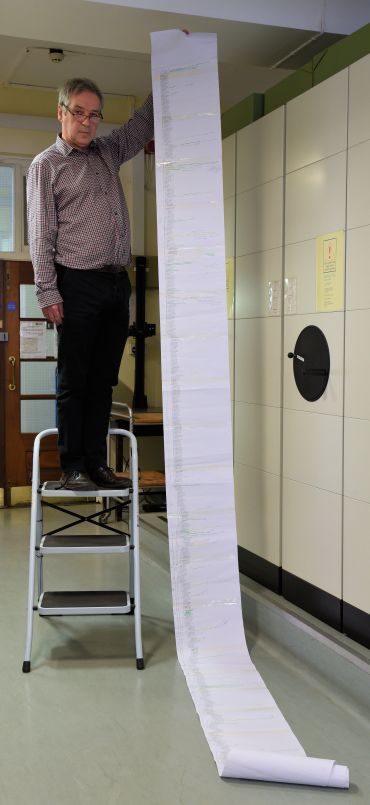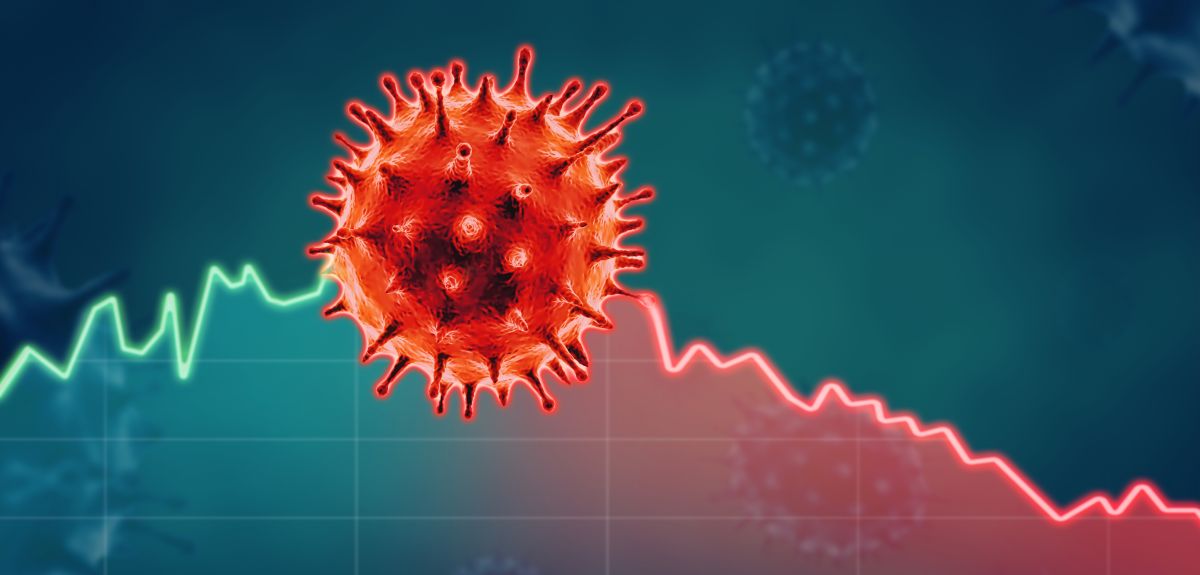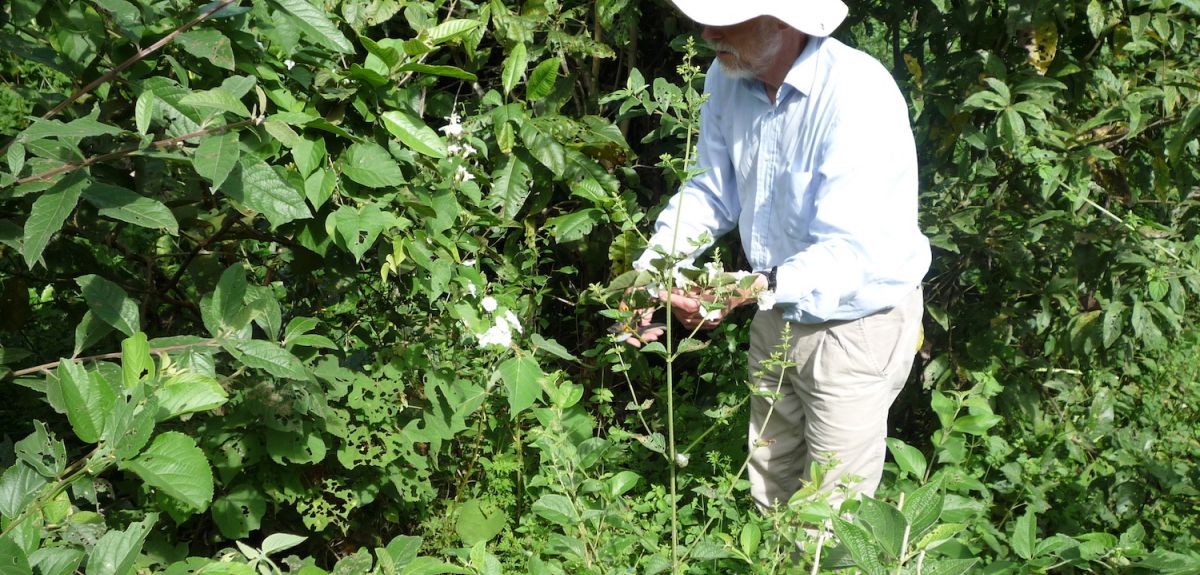Features
by Sarah Whitebloom
Measures taken by governments in the coming months to control COVID-19 will determine the impact of the pandemic on the global and national economies, according to Oxford professor of economics Simon Wren-Lewis. In his latest blog, Professor Wren-Lewis argues: ‘It is impossible to predict what the full year impact will be until we know what controls are essential and what controls can be relaxed while maintaining an effective test/trace/isolate regime.’
His work modelling the impact of a pandemic – which anticipated a six per cent fall in GDP over 12 months – was based on the crisis lasting just three months. But, with COVID-19 set to be present in the community for a longer period, the way that the response is managed and implemented will be critical to its economic impact.
‘We assumed the pandemic was just a three month affair. If we look at our severe pandemic case including falling social consumption, we had GDP in the pandemic quarter falling by 30 per cent. There was a similar fall in consumption. However, because our severe pandemic lasted for just one quarter, GDP for the year as a whole fell by only six per cent. So how good a guide are those numbers to this coronavirus pandemic?’
Key to the economic impact will be ‘the strength of social distancing controls, the degree of business and worker support from governments and whether governments can relax social distancing before three months are up
Professor Wren-Lewis says the predicted fall of 30 per cent ‘does not look obviously wrong and may well be an underestimate’. But, he emphasises ‘this is not a precise figure’.
It is what comes next that is crucial. Key to the economic impact will be ‘the strength of social distancing controls, the degree of business and worker support from governments and whether governments can relax social distancing before three months are up’.
Professor Wren-Lewis says: ‘Once the number of cases are brought right down, it is likely governments will do what China is currently doing, and move to a strict contain regime,’ he writes. ‘This involves a very stringent regime to test those who might still get the virus and the isolation of known contacts, combined with some continuation of social distancing controls....I think this will inevitably be how other countries deal with the virus once numbers are down.’
But, he warns: ‘Some will do it well, and others may not, leading to controls being reintroduced.’
Despite the expected longer term presence of COVID-19, the theory behind the earlier modelling essentially holds true, according to Professor Wren-Lewis. The main supply side impact comes from school closures which, as he says, now look set to last until the summer. Meanwhile, workers will be reluctant to use grandparents – unlike the assumptions in the study.
The study had predicted a fall in social consumption and a heavy impact on the leisure industry – which has been borne out. But, Professor Wren-Lewis says: ‘There is a limit to how far GDP can fall because we will not eat less, and we will not spend less on housing or heating. Expenditure on clothing and particularly durables may be delayed to some extent, as people avoid personal contact, but online purchases should continue.’
Professor Simon Wren-Lewis says: ‘There is a limit to how far GDP can fall because we will not eat less, and we will not spend less on housing or heating
This is why the action that governments take now is so critical. Professor Wren-Lewis says: ‘We assumed there would be no attempt at suppression beyond school closures...This coronavirus pandemic will not be a one quarter affair, because governments quite rightly have not been prepared to see a short sharp peak where their health services will be overwhelmed.’
Talking about initial responses to COVID-19, he continues: ‘Nearly all Western governments underestimated how quickly the virus would spread.’
But, he says: ‘It is easier to control the virus by relaxing controls than creating such controls from scratch...The key issue for the economy once numbers come down is how many controls can be reduced or eliminated while keeping a lid on new case numbers.’
The key issue for the economy once numbers come down is how many controls can be reduced or eliminated while keeping a lid on new case numbers
At the heart of this, on the supply side, will be ‘whether schools reopen’ and on the demand side, ‘what parts of social consumption can be made safer’. Professor Wren-Lewis says: ‘Because some relaxation will almost certainly be possible, then GDP growth will partially bounce back, but how much they will bounce back is very unclear at present...our study, which had GDP being above the no-pandemic case in the second quarter, does not apply to the pandemic we are now in.
‘As a result, the first year GDP impact of a six per cent fall our study is much too small. It is impossible to predict what the full year impact will be until we know what controls are essential and what controls can be relaxed while maintaining an effective test/trace/isolate regime. We will get some idea from China’.
Read more on Professor Wren-Lewis’s blog: https://mainlymacro.blogspot.com/2020/03/the-economic-effects-of-pandemic.html
By Sarah Whitebloom
The UK Government is currently asking people to limit non-essential contact and travel to work from home, in order to slow the spread of COVID-19. But it has not – to date - put in place a system of enforced regulation of movement, unlike some other countries in Europe. The UK action relies heavily on individuals complying with official messaging – doing what they’re told. Will it work?
The UK action relies heavily on individuals complying with official messaging
What does behavioural science tell us about whether people comply with measures that are not compulsory? If you appeal to people’s sense of ‘doing the right thing’, they tend to do it, according to Dr Kate Orkin, senior research fellow in behavioural economics with Oxford’s Blavatnik School of Government, in two recent interviews on BBC’s ‘Beyond 100 Days’.
Behavioural economics’ research from non-pandemic contexts suggests that making behaviours a moral duty will be effective, Dr Orkin says. This suggests the UK Government’s compliance-based approach may have some success. By contrast, it can be ineffective to try to change a problematic behaviour by highlighting that many other people are doing it.
Dr Orkin quotes one study which documents efforts in the Arizona’s Petrified Forest National Park to stop people removing petrified wood. Researchers tested signs with different messages. One sign said ‘Many people keep taking the wood and it is changing the state of the park’. When that sign was up, more wood was taken. According to Dr Orkin: ‘In contrast, when signs simply asked people please not to take the wood, much less wood was taken.’
If you appeal to people’s sense of ‘doing the right thing’, they tend to do it
She argues that the recent statements by the Italian foreign minister, Luigi Di Maio, have been a model here. On 12 March, he made a strong appeal to civic duty, saying: ‘Our grandfathers were drafted to go to war; we're being asked to stay at home.’
He also highlighted that ‘the huge majority of citizens are respecting the rules’ – a key factor in encouraging people to comply is for them to know others are doing the same.
People should realise how much they influence one another. Dr Orkin says: ‘A strong influence on people’s decisions to protect themselves from risk is what people around them are doing.’
She says, if people take Government advice, that will influence those around them to do so too.
These lessons also applied during recent water shortages in Cape Town, South Africa, and Bogota, Colombia. Dr Orkin says, people ‘pulled together’ to make massive, fast cuts in water consumption before cities ran out of water, after strong appeals by local administrations.
So why are people panic buying toilet paper, even when they have been told not to do so?
So why are people panic buying toilet paper, even when they have been told not to do so?
There are two main reasons, according to Dr Orkin. She says: ‘Research shows that, when people feel they lack control, they are more likely to buy useful items, items with a purpose.’
But, she says, the content of messaging is another factor: ‘If you tell people that everyone is doing a bad thing [such as panic buying toilet paper], they will do it as well.’
There are, however, simple solutions. For example, she says that many stores have placed limits on the number of essential items consumers can buy, helping them to overcome their own emotional reactions.
‘It’s really important that people understand the psychology behind why they do things,’ says Dr Orkin.
Dr Kate Orkin leads the Mind and Behaviour Research Group at the Centre for the Study of African Economies at the Blavatnik School of Government.
By Sarah Whitebloom
Emotion and fear of COVID-19, rather than fundamentals, is fuelling stock market turbulence, according to Will Hutton, principal of Hertford College, Oxford and one of Britain’s leading political-economy commentators.
But, says Will Hutton, although the markets could be in for a ‘turbulent’ six months, the coronavirus outbreak could have much long-lasting impacts on the real economy, business and the financial world. In the immediate future he says: ‘The public health emergency is undoubtedly going to affect growth in the second and third quarters. There will be more sickening falls before the market reaction is over....There will be more lurches downwards.’
The best-selling author says there are significant potential impacts beyond the stock market: ‘We can’t just go back to the status quo ante after all this, particularly if there are significant numbers of deaths in the UK and beyond. It won’t be possible.’
I think the world will change, just as the debate has changed. Suddenly we have become aware...our lives have been affected. In the last three or four days, there has been a sudden realisation [that we are going to be personally affected]. And we have to pull together.
With little end in sight, Will Hutton says: ‘Markets are going to be turbulent over the next six months...The markets are panicking. There is a lot of emotion – and some of the losses may have malign cascade effects on the rest of the financial system, whose impact is hard to predict. But some shares are beginning to look cheap, if any type of normality returns, and there will be some benefits in this [for potential investors].’
However in the longer term, Will Hutton says: ‘I think the world will change, just as the debate has changed. Suddenly we have become aware...our lives have been affected. In the last three or four days, there has been a sudden realisation [that we are going to be personally affected]. And we have to pull together.’
Will Hutton says: ‘We need to emphasise the global public good, rather than pull up the drawbridge. It may work in the short term but it won’t save people.’
There needs to be a mind-set change. It’s no good an elite living virus-free behind locked gates, if the people who work for them are struck down by the virus....We need to get a grip on these things.
He says that ‘we need stronger global institutions for the global public good’; institutions such as the WHO and the World Bank. Only such institutions, he believes, can take on a crisis of international proportions, which is only heightened by a populist blame culture that has depicted the virus as a ‘foreign illness for short-term political gain’.
Will Hutton emphasises: ‘There needs to be a mind-set change. It’s no good an elite living virus-free behind locked gates, if the people who work for them are struck down by the virus....We need to get a grip on these things.’
For example, if there is to be safe international airline travel there will have to be some form of internationally validated system of testing of passengers – by the WHO – to ensure the plane is healthy. And to assure people in the destination country that incomers are not going to spread disease. So, while the crisis may inspire demand for more powerful supra-national institutions, Will Hutton maintains, it will also make businesses think again about ‘free-wheeling globalisation’.
One of the long term impacts could be on the way companies organise themselves, so they are not so globally dependent.
He says: ‘One of the long term impacts could be on the way companies organise themselves, so they are not so globally dependent.’
According to Will Hutton, COVID-19 has exposed the dangers of economic populism, globalisation and isolationism. He also says: ‘One key lesson is that health is not only about having the best drugs or clever surgeons, it’s also about the collective good....America going into this pandemic with 27 million people who do not have insurance and millions more in the gig economy. An economic structure like this makes them vulnerable.’
He believes the impact of the crisis will force change at ballot boxes around the world for politicians who have been exposed and found wanting: ‘Some politicians [those who have not taken adequate measures] are going to pay a heavy price for this.’
He adds: ‘We have learned it is essential to direct resources to the hot spots and work together – at home and internationally. The virus doesn’t respect borders of any sort....It has emphasised our inter-dependency.’
Amid the bleak concern, however, Will Hutton has warm words for last week’s Budget from the Chancellor, Rishi Sunak: ‘The state is back, Keynes is back, government taking responsibility is back.'
By Sarah Whitebloom
From Darwin to the present day, creating a monograph is at the heart of biological science. It takes years of painstaking effort and attention to detail to describe and log each and every species in a genus, producing an encyclopaedic guide – the monograph. It is taxonomy at its most taxing.
Large-scale monography is rarely undertaken today and is often seen as passé, dusty even, despite its undoubted value. Nevertheless, a team led by Professor Robert Scotland, of Oxford’s Department of Plant Sciences, has revived this time-honoured art by creating a landmark monograph of the genus Ipomoea. Better known as ‘Morning Glories’, the genus includes more than 800 different species, including the crop, sweet potato. And it is anything but dusty, blending traditional techniques with cutting-edge science to produce a massive monograph of 825 pages.
 Professor Robert Scotland holding the Ipomoea family tree
Professor Robert Scotland holding the Ipomoea family treeAs part of the work, the team needed to identify specimens from around the world. Carrying out such a massive piece of research has taken the team of four more than five years, examining thousands of specimens from 80 different collections in Europe as well as from around the world.
The team has discovered 65 new species and have corrected numerous errors in the labelling of plant specimens in museum collections.
To date, the team has discovered 65 new species and have corrected numerous errors in the labelling of plant specimens in museum collections. They have challenged some long-held ideas cherished by botanists and anthropologists. They have created quite a stir in the South Pacific, because the monograph established that plants had travelled long distances over land and sea, without any human assistance – undermining assertions that the existence of sweet potatoes in Polynesia proved beyond doubt there must have been early contact between the Americas and islanders.
Why does this matter? Aside from the obvious academic uses of the monograph, John Wood, one of the monographs authors, says it has very real implications for the environment and for conservation.
How can you know the future of a plant, if you don’t know of its existence or its characteristics?
‘How can you know the future of a plant, if you don’t know of its existence or its characteristics?’ he asks. This is particularly important in the case of potential food crops, such as the wild relatives of the sweet potato, which is one of the top ten global food crops.
‘Insects and flowering plants are the two big powerhouses of global biodiversity,’ says another of the authors, Dr Pablo Munoz Rodriquez . ‘Yet for groups, such as Ipomoea, we haven’t even known what there is….and there’s no chance you can conserve something, if you don’t know what you’ve got.’
By Sarah Whitebloom
Market hysteria over coronavirus may have seen hundreds of points wiped off indexes around the world this week, but Oxford University experts maintain the COVID-19 crisis should not necessarily foreshadow an economic downturn.
Professor Simon Wren-Lewis, economist and expert in the impact of pandemics at the University of Oxford, maintains that modelling he undertook after the 2008 global financial crisis, shows the coronavirus crisis should have a short-term impact and need not have a long-lasting effect on the UK economy. This view was echoed by Rishi Sunak, the new Chancellor of the Exchequer, during this week’s Budget speech [11 March], when he said the impact of the coronavirus will be ‘temporary’.
Professor Wren-Lewis says: ‘Ever since the global financial crisis (and perhaps before) we have become obsessed with markets and, in particular, their imagined predictive power.’
He added: ‘Looking at the markets, it appears the economic impact of coronavirus will be huge and permanent. In contrast my own study, and others we refer to, suggest something very different: that coronavirus will lead to a large negative shock that will be short term, and certainly will not be permanent. So who is right?’
Based on a three-month virus crisis, Professor Wren-Lewis said his modelling study showed, there is a danger of firms going bust, as we have already seen in the airline sector. But, this week, the banks have said they will support hard-hit businesses and the 2009 study showed that, once the virus is over, firms will become viable again.
It has been widely claimed firms will be vulnerable if they lose production, as workers fall ill or have to take on child care duties because schools are shut. In a blog this week, Professor Wren-Lewis says unwell workers may lead to falls in production but that: ‘Firms have ways of compensating for this…This ‘direct’ impact “[from the effect on the workforce]” of the pandemic in the UK, will reduce GDP in that quarter by a few percentage points.’
His blog says: ‘The impact on GDP for the whole year following the pandemic is much less at around one or two per cent, partly because output after the pandemic quarter is higher as firms replenish diminished stocks and meet postponed demand.’
He continues: ‘Even with all schools closed for three months and many people avoiding work when they are not sick, the largest impact we got [based on the study’s findings] for GDP loss over a year was less than five per cent. That is a very severe one-quarter recession, but there is no reason why the economy cannot bounce back to full strength once the pandemic is over.’
This could still mean that there are short-term problems of supply, with supermarkets unable to keep their shelves stocked with everything. But a decline in demand, caused by people self-isolating and not consuming, could have a more significant impact.
With consumers changing behaviour and avoiding social spending on restaurants, pub visits or entertainment, the leisure industry could be hit hard. These will not be made up after the crisis has passed, with consumers unlikely to eat multiple meals out, in order to compensate for those not eaten during any period of isolation. As part of the Budget, the Chancellor announced special measures to alleviate the impact on the leisure industry, with business rates being lifted and support for the sector.
Professor Wren-Lewis says: ‘If people start worrying about getting the disease sufficiently to cut back on this social consumption, the economic impact will be more severe than any numbers discussed so far. One reason it is severe is that it is partly a permanent loss.’
Nevertheless, according to the economic modelling, the largest fall in annual GDP was six per cent. ‘It is in this light that we should view the collapse of stock markets around the world. In macroeconomic terms this is a one-off shock,’ according to Professor Wren-Lewis.
He adds: ‘Markets dislike uncertainty, and so you are likely to see an overreaction.’ But, he says, this should not be allowed to distract policymakers from following the best medical advice.
Some of the measures Professor Wren-Lewis said would alleviate the situation for the economy have been taken, ’although more could be done to encourage low paid or self-employed workers to self-isolate’.
Banks have extended lending and given mortgage-holidays to customers in need. Chancellor Sunak maintains that he will be having regular meetings with the banks. And the Budget contains a series of measures, aimed at protecting businesses and individuals from the potential economic impact of the coronavirus.
Read more on Professor Wren-Lewis’s blog: https://mainlymacro.blogspot.com/2020/03/the-economic-effects-of-pandemic.html
Funding for Oxford’s COVID-19 research requires unprecedented speed, scope and ambition. Find out how you can support us here.
- ‹ previous
- 42 of 248
- next ›





 Teaching the World’s Future Leaders
Teaching the World’s Future Leaders  A blueprint for sustainability: Building new circular battery economies to power the future
A blueprint for sustainability: Building new circular battery economies to power the future Oxford citizen science project helps improve detection of antibiotic resistance
Oxford citizen science project helps improve detection of antibiotic resistance The Oxford students at the forefront of the fight against microbial resistance
The Oxford students at the forefront of the fight against microbial resistance  The hidden cost of AI: In conversation with Professor Mark Graham
The hidden cost of AI: In conversation with Professor Mark Graham  Astrophoria Foundation Year: Dr Jo Begbie reflects on the programme’s first year
Astrophoria Foundation Year: Dr Jo Begbie reflects on the programme’s first year World Malaria Day 2024: an interview with Professor Philippe Guerin
World Malaria Day 2024: an interview with Professor Philippe Guerin From health policies to clinical practice, research on mental and brain health influences many areas of public life
From health policies to clinical practice, research on mental and brain health influences many areas of public life From research to action: How the Young Lives project is helping to protect girls from child marriage
From research to action: How the Young Lives project is helping to protect girls from child marriage